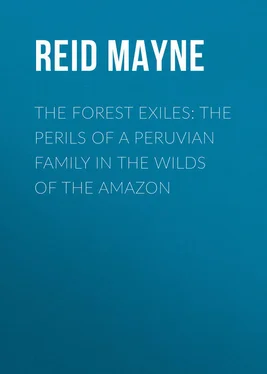Mayne Reid - The Forest Exiles - The Perils of a Peruvian Family in the Wilds of the Amazon
Здесь есть возможность читать онлайн «Mayne Reid - The Forest Exiles - The Perils of a Peruvian Family in the Wilds of the Amazon» — ознакомительный отрывок электронной книги совершенно бесплатно, а после прочтения отрывка купить полную версию. В некоторых случаях можно слушать аудио, скачать через торрент в формате fb2 и присутствует краткое содержание. Жанр: literature_19, foreign_antique, foreign_prose, на английском языке. Описание произведения, (предисловие) а так же отзывы посетителей доступны на портале библиотеки ЛибКат.
- Название:The Forest Exiles: The Perils of a Peruvian Family in the Wilds of the Amazon
- Автор:
- Жанр:
- Год:неизвестен
- ISBN:нет данных
- Рейтинг книги:4 / 5. Голосов: 1
-
Избранное:Добавить в избранное
- Отзывы:
-
Ваша оценка:
- 80
- 1
- 2
- 3
- 4
- 5
The Forest Exiles: The Perils of a Peruvian Family in the Wilds of the Amazon: краткое содержание, описание и аннотация
Предлагаем к чтению аннотацию, описание, краткое содержание или предисловие (зависит от того, что написал сам автор книги «The Forest Exiles: The Perils of a Peruvian Family in the Wilds of the Amazon»). Если вы не нашли необходимую информацию о книге — напишите в комментариях, мы постараемся отыскать её.
The Forest Exiles: The Perils of a Peruvian Family in the Wilds of the Amazon — читать онлайн ознакомительный отрывок
Ниже представлен текст книги, разбитый по страницам. Система сохранения места последней прочитанной страницы, позволяет с удобством читать онлайн бесплатно книгу «The Forest Exiles: The Perils of a Peruvian Family in the Wilds of the Amazon», без необходимости каждый раз заново искать на чём Вы остановились. Поставьте закладку, и сможете в любой момент перейти на страницу, на которой закончили чтение.
Интервал:
Закладка:
On frequented roads, where such places occur, it is usual for travellers, entering upon them, to shout, so that any one, who chances to be coming from the opposite side, may have warning and halt. Sometimes this warning is neglected, and two trains of mules or llamas meet upon the ledge! Then there is a terrible scene – the drivers quarrel – one party has to submit – their animals have to be unloaded and dragged back by the heels to some wider part of the path, so that each party can get past in its turn!
Near the highest part of the road, our travellers had entered upon one of these narrow ledges, and were proceeding along it with caution. The trusty mule, that carried Doña Isidora and Leona, was in front, the horse followed, and then the llamas. It is safer to ride than walk on such occasions, especially upon mules, for these animals are more sure-footed than the traveller himself. The horse that carried Leon, however, was as safe as any mule. He was one of the small Spanish-American breed, almost as sure-footed as a chamois.
The torrent rushed and thundered beneath. It was fearful to listen and look downward; the heads of all were giddy, and their hearts full of fear. Guapo, alone accustomed to such dangers, was of steady nerve. He and Don Pablo afoot were in the rear.
They had neared the highest point of the road, where a jutting rock hid all beyond from their view. They were already within a few paces of this rock, when the mule – which, as we have stated, was in the front – suddenly stopped, showing such symptoms of terror that Doña Isidora and the little Leona both shrieked!
Of course all the rest came to a halt behind the terrified and trembling mule. Don Pablo, from behind, shouted out, inquiring the cause of the alarm; but before any answer could be given the cause became apparent to all. Around the rock suddenly appeared the head and horns of a fierce bull, and the next moment his whole body had come into view, while another pair of horns and another head were seen close behind him!
It would be difficult to describe the feelings of our travellers at that moment. The bull came on with a determined and sullen look, until he stood nearly head to head with the mule. The smoke of his wide steaming nostrils was mingled with the breath of the terrified mule, and he held his head downward, and evidently with the intention of rushing forward upon the latter. Neither could have gone back, and of course the fierce bull would drive the mule into the abyss. The other bull stood close behind, ready to continue the work if the first one failed, and, perhaps, there were many others behind!
The mule was sensible of her danger, and, planting her hoofs firmly on the hard rock, she clung closely to the precipice. But this would not have served her, had not a hand interposed in her behalf. Amidst the terrified cries of the children, the voice of Guapo was heard calling to Don Pablo, – “Your pistols, master! give me your pistols!”
Something glided quickly among the legs of the animals. It was the lithe body of the Indian. In a second’s time he appeared in front of the mule. The bull was just lowering his head to charge forward – his horns were set – the foam fell from his lips – and his eyes glanced fire out of their dark orbs. Before he could make the rush, there came the loud report of a pistol – a cloud of sulphury smoke – a short struggle on the cliff – and then a dead plunge in the torrent below!
The smoke partially cleared away; then came another crack – another cloud – another short struggle – and another distant plash in the water!
The smoke cleared away a second time. The two bulls were no longer to be seen!
Guapo, in front of the mule, now ran forward upon the ledge, and looked round the buttress of rock. Then, turning suddenly, he waved his hand, and shouted back —
“No more, master; you may come on – the road is clear!”
Chapter Thirteen.
The lone Cross in the Forest
After two more days of fatiguing travel, the road parted from the bank of the river, and ran along the ridge of a high mountain spur in a direction at right angles to that of the Andes themselves. This spur continued for several miles, and then ended abruptly. At the point where it ended, the path, which for the whole of the day had been scarcely traceable, also came to an end. They were now of course in a forest-covered country – in the Ceja de la Montaña – that is, the forest that covers the foot-hills of the mountains. The forest of the plains, which were yet lower down, is known as the “Montaña” proper.
During that day they had found the road in several places choked up with underwood, and Guapo had to clear it with his macheté – a sort of half-sword, half-knife, used throughout all Spanish America, partly to cut brushwood and partly as a weapon of defence. Where the ridge ended, however, what had once been a road was now entirely overgrown – vines and llianas of large size crossed the path. Evidently no one had passed for years. A road existed no longer; the luxuriant vegetation had effaced it.
This is no unusual thing on the borders of the Montaña. Many a settlement had existed there in former times, and had been abandoned. No doubt the road they had been following once led to some such settlement that had long since fallen into ruin.
It is a melancholy fact that the Spanish-Americans – including the Mexican nation – have been retrograding for the last hundred years. Settlements which they have made, and even large cities built by them, are now deserted and in ruins; and extensive tracts of country, once occupied by them, have become uninhabited, and have gone back to a state of nature. Whole provinces, conquered and peopled by the followers of Cortez and Pizarro, have within the last fifty years been retaken from them by the Indians : and it would be very easy to prove, that had the descendants of the Spanish conquerors been left to themselves, another half century would have seen them driven from that very continent which their forefathers so easily conquered and so cruelly kept. This reconquest on the part of the Indian races was going on in a wholesale way in the northern provinces of Mexico. But it is now interrupted by the approach of another and stronger race from the East – the Anglo-American.
To return to our travellers. Don Pablo was not surprised that the road had run out. He had been expecting this for miles back. What was to be done? Of course they must halt for that night at least. Indeed it was already near camping-time. The sun was low in the sky, and the animals were all much jaded. The llamas could not have gone much farther. They looked as if they should never go farther. The heat of the climate – it had been getting warmer every hour – was too much for them. These animals, whose native home is among the high cool mountain valleys, as already observed, cannot live in the low tropical plains. Even as they descended the Sierras they had shown symptoms of suffering from the heat during all that day. Their strength was now fairly exhausted.
The party halted. A little open space was chosen for the camp. The animals were relieved of their burdens and tied to the trees, lest they might stray off and be lost in the thick woods. A fire was kindled, and part of the vicuña meat cooked for supper.
It was not yet night when they had finished eating, and all were seated on the ground. The countenance of the father was clouded with a melancholy expression. Doña Isidora sat by his side and tried to cheer him, endeavouring to force a smile into her large black eyes. The little Leona, with her head resting on her mother’s lap, overcome with the heat and fatigue, had fallen asleep. Leon, seeing the dejected look of his father, was silent and thoughtful. Guapo was busy with his llamas.
Читать дальшеИнтервал:
Закладка:
Похожие книги на «The Forest Exiles: The Perils of a Peruvian Family in the Wilds of the Amazon»
Представляем Вашему вниманию похожие книги на «The Forest Exiles: The Perils of a Peruvian Family in the Wilds of the Amazon» списком для выбора. Мы отобрали схожую по названию и смыслу литературу в надежде предоставить читателям больше вариантов отыскать новые, интересные, ещё непрочитанные произведения.
Обсуждение, отзывы о книге «The Forest Exiles: The Perils of a Peruvian Family in the Wilds of the Amazon» и просто собственные мнения читателей. Оставьте ваши комментарии, напишите, что Вы думаете о произведении, его смысле или главных героях. Укажите что конкретно понравилось, а что нет, и почему Вы так считаете.












